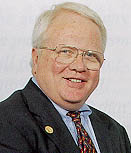
A Letter from Phil Kirk
Manufacturing
Remains Vital to North Carolina
Manufacturing
continues to be the backbone of our diverse economy in North Carolina.
Yes, we have
lost some jobs, especially in textiles and apparel, but the
manufacturing sector continues to provide hundreds of thousands of
good-paying jobs in our state. During the past year, North Carolina
had the distinction of losing more manufacturing jobs than any other
state. We also have the highest percentage of our employees in
manufacturing than any other state.
Travel and
tourism, pharmaceuticals, transportation, government, the professions,
and the service industry all provide important employment
opportunities, but we often overlook manufacturing and its importance
to our state.
Manufacturing
nationwide makes the highest contribution to economic growth. In the
past decade, manufactured output accounted for 29 percent of the
growth in the Gross Domestic Product — more than any other sector.
By comparison, services contributed 19 percent; transportation and
utilities, 10 percent; and finance, insurance and real estate, 13
percent.
In North
Carolina, manufacturing contributed $55 billion to our economy in the
most recent year available. It consistently achieves the highest
productivity growth rates. They averaged 3.7 percent since 1991 and
then accelerated to 4.7 percent in the past four years.
Manufacturing’s
main impact on growth is through technological advance. It also makes
smaller, but still significant contributions to labor and capital
investment.
I was
surprised to learn that manufacturing alone contributes 57 percent of
total research and development. In fact, three manufacturing
industries — transportation equipment, electronics and chemicals —
account for 38 percent of research and development. Increased research
and development and higher productivity lead to higher pay for
workers. In 1997, the average manufacturing employee earned $39,300 in
wages, or $48,000 counting benefits. Unfortunately, oppressive
government taxation gobbled up much of the increase in actual wages.
Free trade is
a big economic issue for manufacturers. Earlier they may have been
content to serve the 275 million consumers in the U.S. Now they go
after the 5.75 billion consumers around the world. In fact,
manufacturing accounts for 62 percent of all U.S. exports.
Exports from
the U.S. totaled more than $1 trillion last year for the first time.
In 1985, seven percent of U.S. manufactured products were exported —
now the percentage has more than doubled. Nearly 30 percent of all
new, private-sector jobs have been created because of the growth in
exports.
The casual
observer would probably guess that exports are primarily the concern
of big business. The opposite is true: 92.6 percent of all exporting
manufacturers have fewer than 500 employees.
Another
popular myth is that imports from low-wage countries take away jobs
from U.S. workers. In fact, the majority of U.S. imports comes from
the other industrialized countries with highly paid workers,
principally Europe, Canada and Japan.
Some
manufacturers have been forced to invest abroad; however, their 1994
domestic investment was close to $800 billion, 10 times the amount
invested overseas.
Trying hard to
remain competitive, at least 40 percent of U.S. manufacturers are
spending at least two percent of payroll on training and re-training.
That’s more than double what they spent in the early 1990s. Much of
this training in our state is provided by the 59 community colleges.
We are pleased
to be the official state affiliate for the respected National
Association of Manufacturers and also to have more than 400
manufacturers as members of NCCBI. That’s nearly one-fifth of our
diverse membership.
Return to magazine index
|
|

